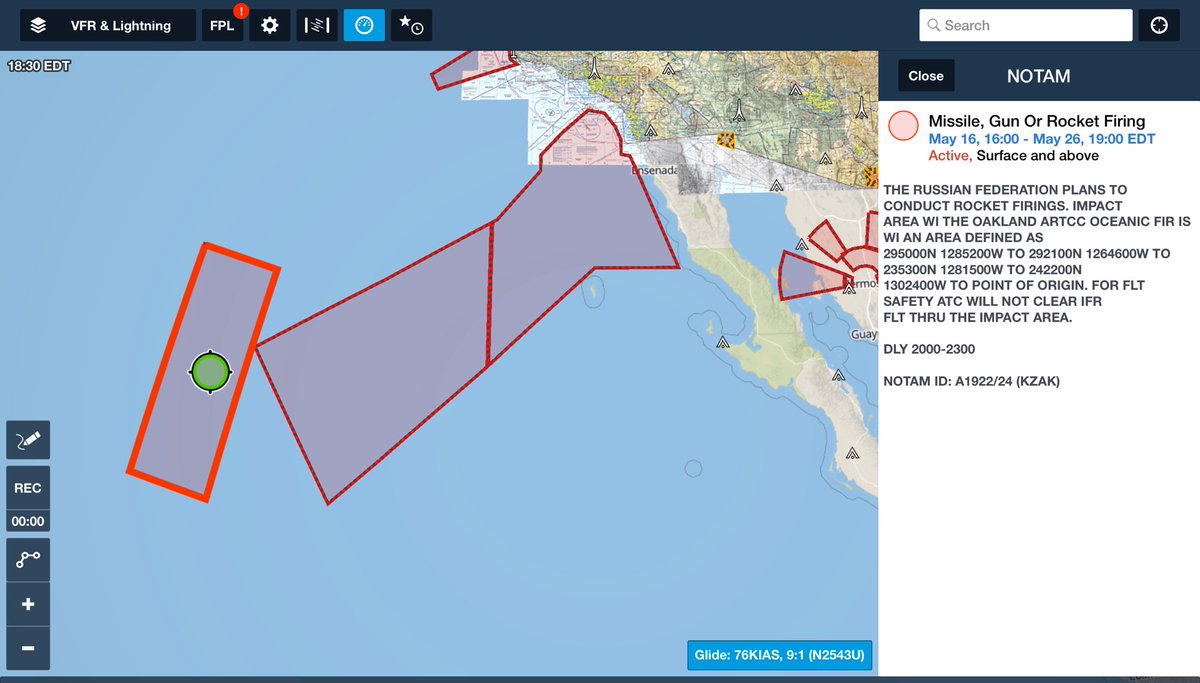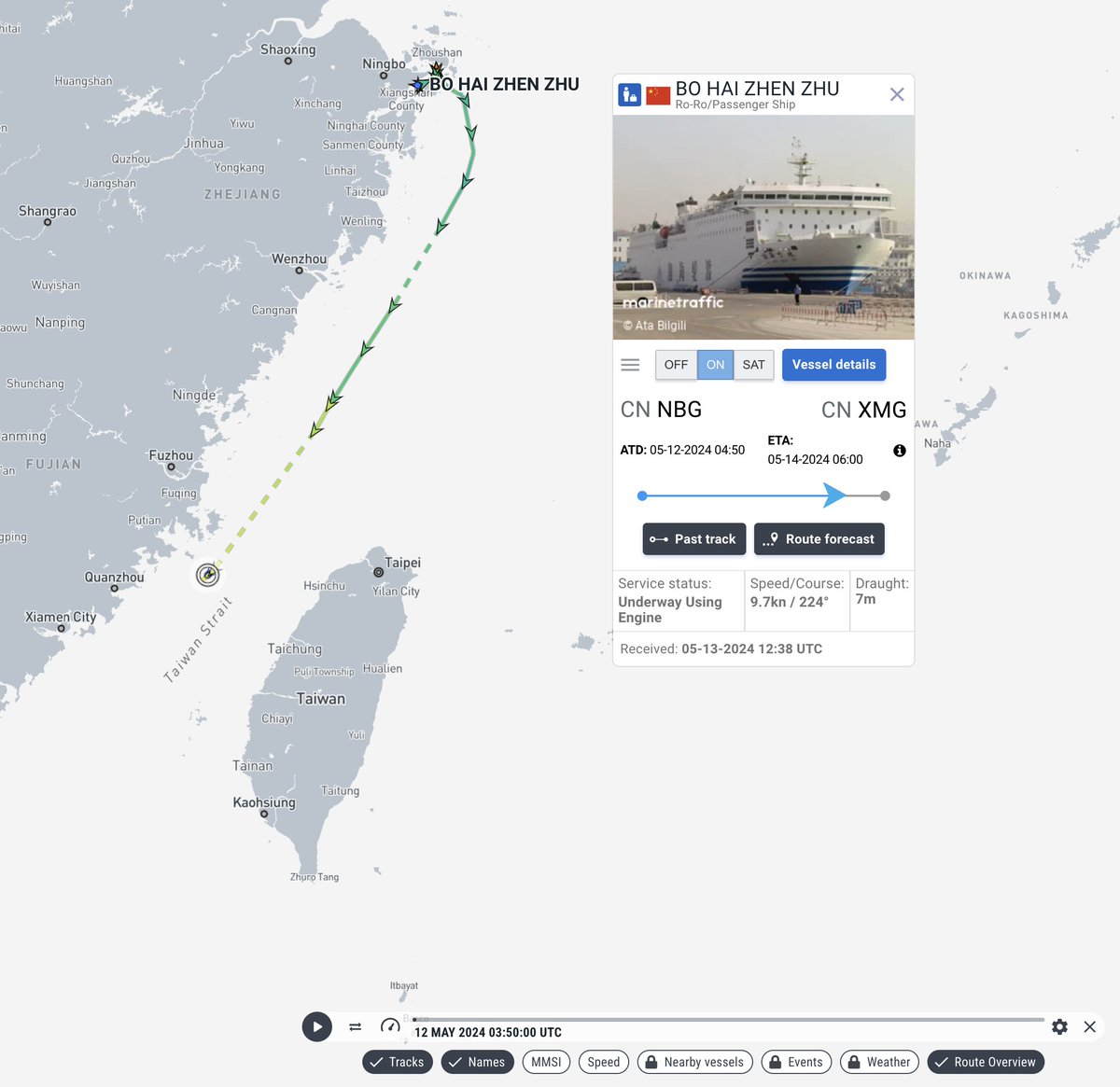What if I told you that as I type this there was a vessel, associated with the Chinese PLA, that *could* be equipped with many dozens of anti-ship cruise missiles—and was parked less than 4 miles from the bulk of the U.S. Atlantic Fleet.
Well guess what: it's happening—for real.
Well guess what: it's happening—for real.

The vessel in question is a container ship named COSCO Shipping Sakura. It's a massive ship, more than 360m long (~1200 ft), and weighing far more than a U.S. aircraft carrier. Built in 2018, It can carry more than 14000 shipping containers. 

The shipyard that built it, Jiangnan Shipyard, in addition to building ships for COSCO (and western, even TAIWANESE companies!) also builds warships for the PLA Navy, including its first full-size aircraft carrier. features.csis.org/china-shadow-w…
The company that owns and operates the ship, COSCO Shipping Lines Ltd, is part of the COSCO Group, a Chinese state-owned company that is one of the largest shipping companies in the world. The group works directly with the PLA on a routine basis... gcaptain.com/is-cosco-china…
...providing support to deployed PLA warships through the shipping line... .csis.org/analysis/hidde…
...and going further, the ferries in its shipping subsidiary are organized as an auxiliary support fleet to the PLA. Some have been modified to act as adjunct amphibious assault ships, and directly take part in PLA landing exercises. cimsec.org/ro-ro-ferries-…
As is true for any Chinese SOE, the company leadership has dual loyalty - as leaders both of the company and representatives of the Chinese Communist Party. 

The group's web site has an entire section on its dedication to the CCP and implementation of its goals, though you will not find this page on the English-language version of the site (this is machine-translated Chinese). 

Per a recent @ChinaMaritime report, many state-owned merchant, particularly those going overseas, have onboard CCP political officers. digital-commons.usnwc.edu/cmsi-maritime-…
Via the 2016 National Defense Transportation Act, new Chinese ships are built to national defense standards, and Chinese organizations can be required to support China's national defense requirements. chinapower.csis.org/analysis/china…
So...where does the "hundreds of missiles" part come from? China, which has openly displayed its development of containerized missiles.
While ostensibly for coastal defense, these systems are also advertised for their "capability to disguise" themselves. globaltimes.cn/page/202211/12…
While ostensibly for coastal defense, these systems are also advertised for their "capability to disguise" themselves. globaltimes.cn/page/202211/12…
The systems displayed are capable of carrying 4 missiles - big ones, like the YJ-12 supersonic anti-ship missile, and the anti-ship YJ-18, which has a land-attack variant and a range of up to 540 km. missilethreat.csis.org/missile/yj-18/
This is to say nothing of the much larger numbers quadcopters attack drones that can and are being loaded into shipping containers. twz.com/news-features/…
By my count, COSCO Sakura has 22 rows of shipping containers lengthwise, and 19 rows wide across its beam. If we don't count the first 2 rows, which are narrower, then that's a top surface of 380 containers. 

If only, say, 10% of those containers were used for munitions, they could for example field 144 cruise missiles and 252 quadcopters, more than enough to devastate every warship at Norfolk, and able to reach land targets across the mid-Atlantic and well past DC. 

Also of note, China's maritime militia (also ostensibly civilian vessels) routinely practices mine laying, including under the cover of darkness. digital-commons.usnwc.edu/cmsi-red-books…
COSCO Sakura's path into Norfolk took it past Norfolk Naval Station, within only a few hundred yards of its aircraft piers, including those for nuclear submarines and near-irreplaceable aircraft carriers (see also its shape for size). Presumably it'll depart the same way.




It's worth understanding that Chinese military writings are obsessed with striking by surprise to seize the initiative, particularly against a "powerful enemy", and that the best way to destroy enemy ships is in port. cnas.org/publications/c…
So, what is to be done?
To be clear, I'm not saying THIS SHIP is likely to be armed or doing anything nefarious. But for the reasons above, one much like it could be at some other time, in some other place, in advance planned Chinese military aggression.
To be clear, I'm not saying THIS SHIP is likely to be armed or doing anything nefarious. But for the reasons above, one much like it could be at some other time, in some other place, in advance planned Chinese military aggression.
The U.S. government already has sanctions in place against a long list of companies that support the PLA. defense.gov/News/Releases/…
It seems entirely reasonable that a company like COSCO could be sanctioned. Portions of it already have been, though for different reasons (shipping oil to Iran). selectcommitteeontheccp.house.gov/media/press-re…
Some might say it'd cause economic disruption to ban COSCO (or other PLA-associated) ships from U.S. ports. And that might be true. But I think we have to weigh that against the very real military risk we're accepting (including intel collection 🕵️) by routinely allowing them in.
Others will likely point out that U.S. civilian ships, too, also routinely support the U.S. Department of Defense by providing transportation services under the Maritime Security Program. maritime.dot.gov/national-secur…
But I would say that modifying its ships to directly take part in PLA combat operations (such as an invasion of Taiwan), and then routinely taking part in exercises practicing doing so, takes COSCO to another level. defensenews.com/naval/2021/08/…
The recent CCP Third Plenum indicated that we should expect ever-deeper Chinese civil-military integration.
Perhaps we should take them at their word, and treat companies like COSCO as the adjuncts of the PLA that they are increasingly seeming to be. warontherocks.com/2024/07/in-bri…
Perhaps we should take them at their word, and treat companies like COSCO as the adjuncts of the PLA that they are increasingly seeming to be. warontherocks.com/2024/07/in-bri…
• • •
Missing some Tweet in this thread? You can try to
force a refresh

















